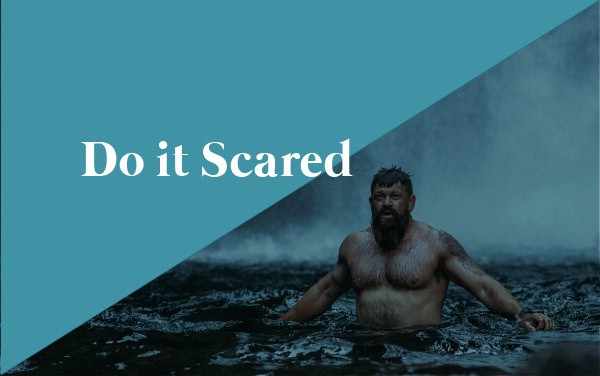
by RE Helper | Mar 15, 2024 | Blog, Early Sobriety, Expectations, The first Year, Uncategorized
Today’s blog entry is from Danielle Marr. Danielle has been a member of Café RE since June 2023. Danielle taught our most recent Ditching the Booze: Writing a New Narrative Course and was one of the teachers in our REstore Dray January Course. She is an active and supportive member of her Café RE OG group!
Do It Scared
By: Danielle Marr (Café RE OG)
Last fall, I committed to teaching Ditching the Booze: Writing a New Narrative, a 5-week course inside of the Café RE community.
As I reflect on that experience, there is so much coming up for me. I was on day three when I reached out to the team to see if they would be interested in hosting a writing course or workshop and the timing could not have been better.
It was one of those serendipitous, Big Magic-type moments where something inside of me said, “do this,” even though it didn’t make sense at all.
I had three days of sobriety – who was I to try to lead a group of people in a course on sobriety?
But I jumped anyway.
It was almost like I was taken over by some unknown source of energy that made me hit send on that email. And, as it turned out, there was a gap that needed to be filled.
The person who normally hosts the fall installment of the Ditching The Booze course had told Paul the day prior that he was unable to do so this time around due to life circumstances. As Paul was working on an email to Kerri with ideas of alternative course suggestions, my email asking them if they were interested in the idea of a writing course landed in her inbox.
Like…what?!
So, we went for it. More than 250 people registered.
Taking a Big Leap of Faith Doesn’t Always Make Sense In The Beginning
I prepped as best I could, and I ran the course every Monday for five weeks. I did it, like…pooping my pants, holy heck, what have I gotten myself into, scared.
And I did it even though I knew I would be leading a group of people in something that was so new to me. A group of people, half of whom, had more than a year of sobriety under their belt.
But the thing was that, even though I didn’t have much sobriety time under MY belt yet, I believed so deeply in the work. I believe so deeply in the power of writing your own story. And I knew, through hearing so many other people’s stories, that service to others is an amazing way to contribute to your own sobriety journey.
I told myself again and again that if I could help even just one person take the next tiny little step on their recovery journey by learning how to unpack and write their own story, all of the fear and doubt I had in myself would be worth it.
That didn’t make it any less terrifying though.
I have never had the confidence or self-trust to consider myself a teacher or a leader. I’m sure that was somewhat apparent to the participants in the class. But, the thing is, there is only one way to grow and that was a beautiful opportunity for me to work on my growth. Leading writing workshops and courses in the recovery space is something I want to do a whole heck of a lot more of moving forward.
When You Allow Yourself to Take The First Step, The Rest of The Journey Gets a Little Bit Easier
I led one of the classes for the January REStore course. I was able to tackle it from a place of experience, and a little bit more confidence.
But the first step was doing it scared.
Doing it without knowing how it would land.
Having sweaty palms and a racing heart, but showing up anyway.
I was able to do that because of the amazing support and faith that both Paul and Kerri showered me with leading up to and throughout the course. And the feedback that we got on the course was, to put it lightly, phenomenal. That last call will go down in the books as one of my most powerful sobriety moments thus far.
The thank you’s, and the beautiful, brave souls speaking up to say how much they had been looking forward to Monday nights all month long, among other wonderful acknowledgements truly warmed my heart in a way I don’t know I can ever fully express.
I started thinking about some of this after we got off that last call. And while I didn’t say it at the moment, I knew I needed to write about it.
Because it is such a beautiful representation of what it takes to quit drinking in the first place.
When we are so wrapped up in addiction, and we’ve been living a life consumed by that substance for so long, we don’t know what life is going to look like when we quit.
And that is an unbelievably terrifying prospect.
From the fear of what will happen to our bodies and what the withdrawal process will look like. How we will fill our days and who will want to spend time with us. It’s all such a big, hairy, scary unknown.
You have to do it scared to get to the other side.
Leap Without The Net & Trust That The Person You Are About to Become Will Be There to Catch You
You have to leap without the net. And then hope the version of you that you are about to become will be there to catch you. (Along with a truly amazing sobriety community if you happen to be part of something like Cafe RE).
You have to have so much visceral trust in yourself and the reason why you are doing it.
So, my message to anyone reading this is that if something is calling to you in your heart – whether it’s taking the leap to quit drinking or putting yourself out there by joining a community and opening up after months or years of self-isolation, or even applying for a job – do it scared.
Take the leap and trust that the net will appear.
Know that it might not go the way that you expect it to go.
That there will be hiccups. Moments of two steps forward and one step back. And you will probably feel like you have no idea what you are doing. But if it is something you know so deeply in your heart is going to be worth it, even if wading through the darkness of the unknown seems like the most terrifying prospect in the world right now, try anyway.
The time will pass one way or the other, but if you try, and you really give it your best effort, you will be proud of yourself. You’ll know that you did what you could with the resources you had available to you at the time. You’ll know that you showed up for yourself in ways that you’ve never done before.
You can so totally do this. Even if you’re scared.
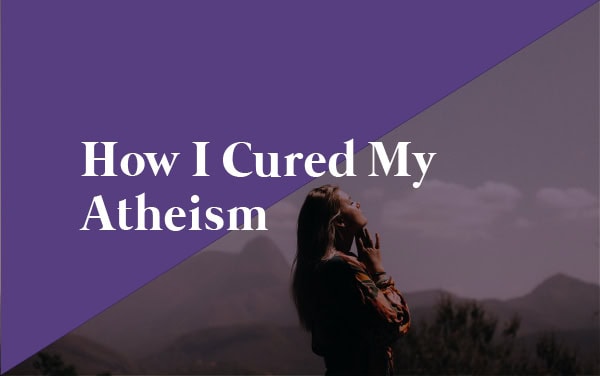
by RE Helper | Jan 15, 2024 | Alcohol Free, Blog, Expectations, Helpful Tips, Resources, Uncategorized
Today’s blog entry is from Bobbie Malatesta. Bobbie has been a member of Café RE since February 2020. Bobbie just celebrated 4 years alcohol free and is a big source of support to her Café RE UP group!
How I Cured My Atheism
By: Bobbie Malatesta (Café RE UP)
Recently, someone shared a beautiful acronym that I wish I had earlier in my spirituality journey. Before I get into that, please allow me to explain a little of my history in this department.
In my family, we had the Italian and Polish grandparents that were traditionally Catholic. My parents didn’t make us be Catholic except for when we went to weddings and funerals of course. I was given the option to choose what religion I wanted to be.
At age 10, I decided to get baptized a Baptist. I was to stand in a sunken tub in the church and get dunked by the clergy and that would be that, right? Well, not exactly. I begged the man baptizing me to hold my nose when he dunked me. Guess what? He didn’t!!
And so began my atheism. How could I trust this God if his person couldn’t even help me with my minor little request? Staying true to my disbelief and anger was easy as my life unfolded. Trauma, tragedy, death after death, abandonment, and all the other bull-oney that life has to offer seemed to start and never stop in my life. How could there possibly be a “”God” if all these bad things kept happening to me?
And so my life went.
Once I joined 12 Step and had to memorize the Serenity Prayer, it got a bit more challenging. Any time my GA crew wanted me to kick off the prayer, they expected me to say that “G” word but I didn’t want to talk to him. I still didn’t believe in him. On account of my big mouth and the fact that one of the principles in the program is that you don’t have to believe in the G word per seh, we found a compromise. Whenever I started the prayer, I addressed the Universe. Eventually, some of my fellows would start with Universe too, in support of me.
Things were going along just great until I got to Step 11. “ Sought through prayer and mediation…. conscious contact with GOD….” Oh Sugar! It was time to revisit this whole God concept for me. Long story short, I started going to church, meditating and doing the work so I could “graduate” Step 11.
One of my favorite parts of doing this “work” was being in recovery communities like Café RE. Working on Recovery Dharma, Sober travel trips with beautiful peers, learning from Patrick and appreciating the landscape of Bozeman all contributed to what is defined as spirituality to me now. I can see God now in the essence of people, sunsets and sunrises and music. The key is it doesn’t have to be labeled as god, universe or any other word in particular.
The end result was that for me, I now believed in a God, and I still choose to call her or him, Universe.
Now, I have embraced and want to share GUS!
GUS was there all along and I heard about him when I was supposed to, recently at a conference.
GUS stands for:
God
Universe
Source/ Spirit
I am believer that there is no one right way for anything, including our own spirituality. This is not meant an insult to anyone’s faith or choices, but to offer a solution to anyone who might be stuck on this premise like I was.
Either way, GUS got us, no matter what you call her/ him/ it.
Thanks for letting me share!
With Love & gratitude,
Bobbie
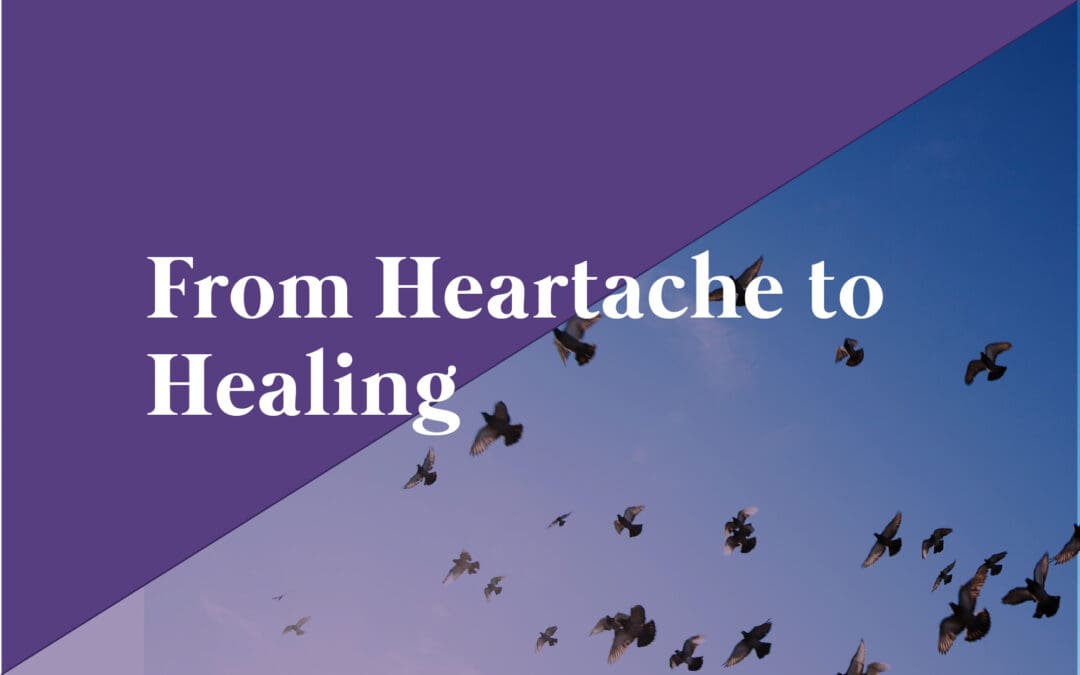
by RE Helper | Dec 15, 2023 | Alcohol Free, Blog, Early Sobriety, The first Year, Uncategorized
Today’s blog entry is from Adam Whitman. Adam has been a member of Café RE since September 2022. Adam has been alcohol free since January 1, 2023 and is very active within his Café RE OG community.
From Heartache to Healing
By: Adam Whitman (Café RE OG)
February 1st, 2023
My first month of sobriety is written in the books. 
The pink cloud is in full view and you better believe I’m right up in it. I take that back. I’m above it. Look at me soar. I’ve actually done it. I quit drinking. And you know, it isn’t that hard. Might I dare say it’s easy? I don’t even want to drink. It’s gross. I actually think it’s gross now.
I can’t hold back. I’m going to say it.
I am a freaking badass.
August 1st, 2023
My seventh month of sobriety is written in the books.
My negative thinking is out of control. Insecurities are running rampant. I no longer relate to my circle of friends. “I don’t like the new Adam” they say as I watch them slowly slip away.
And I’ve gotten fatter. What? Fatter? How the f**k did that happen?
I’m in the midst of the worst people pleasing flareup of my life. My marriage is hanging on by a thread. The woman who I’ve shared 22 years of my life with, who I’ve raised two beautiful children with, is tired. We’re both tired. And I’m not sure we can hold on much longer.
I can’t hold back. I’m going to say it.
I am a freaking mess.
August 5th, 2023
Today I set sail to the RE Bozeman Retreat. I’m driving. Yes, you heard me right. This Texas boy is driving to Montana–3,200 miles round trip. Let’s do this.
But wait a second. Was I really talking about splitting assets with my wife yesterday? Were we really talking about how we would manage custody of our children? What the hell is going on?
Maybe I shouldn’t go. But right now, Bozeman seems to be the only answer. As to what the question is, I have no idea. One thing remains certain.
My life is a wreck.
Trinidad Lake State Park
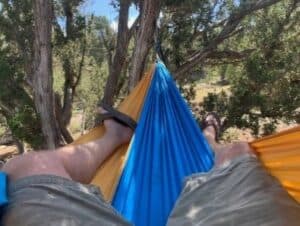 Eight hours to Trinidad, Colorado complete.
Eight hours to Trinidad, Colorado complete.
The tent is up and I’m resting easy in my hammock. Look at me go. I can do this alone. I don’t need anyone. In fact, being alone is better. I am one strong dude. Back and forth my hammock swings between two trees until the sun goes down and the darkness sets in.
I’m lonely.
And afraid.
Did she really say she would leave me?
Quitting drinking uncovered some shit, didn’t it? I can’t get these thoughts out of my head. Who imagined it would be a good idea to venture out into the world alone in a tent for three days? Why am I such a mess? Will I ever get better? Will I be able to stop thinking about her? About me? About all of the shame and regret?
Sun, you can come up now.
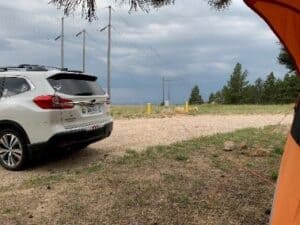 August 6th, 2023
August 6th, 2023
Glendo State Park
Six hours to Glendo, Wyoming complete.
My tent is pitched. It appears as if I’m the only person in this park. Rain starts to fall.
The negative thoughts continue to flood my mind. In addition, the solitude is proving that I really annoy myself. What does that even mean? I annoy myself? Is this what it’s like for others to be around me?
The thoughts continue to relentlessly take over. But within the constant bombardment of negative thinking a new softly spoken response starts to emerge.
Tell the thoughts to stop.
But I can’t.
Yes, you can. Quiet them. Just try it.
Adam, you’ve hurt people. Shh… Adam, you’re not doing enough. Shh… Adam, you’re worthless. Shh… Adam, you’re a failure. Shh… Over and over, like a broken record. Shh…. Enough.
Did drinking cause this madness? No. It hid it though, buried it deep. And now it’s here crawling out of the dark threatening me, whispering lies. I keep telling it to shut the hell up. But will it listen?
Persistence remains.
Time will tell.
August 7th, 2023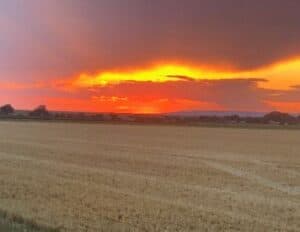
Grandview RV Park
Five hours to Hardin, Montana complete.
I chose an RV park this time, laundry and a hot shower, and people too. It’s been awhile. They distract me. This is good. The sunset is beautiful. I order a pizza and rest.
Tomorrow I will be in Bozeman. There I will finally be in the physical presence of my Recovery Elevator friend Jim. We initially met at the REstore Dry January course, the course where my journey towards enlightenment started, where the ups and downs of sobriety began. And Jim held onto me throughout.
If you know Jim that shouldn’t surprise you.
August 8th, 2023
Days Inn Bozeman
Four hours to Bozeman Montana complete.
It’s my first night out of a tent and in a motel. Jim is staying here too. I’m nervous.
After a couple of hours, we meet for dinner. During our introduction a firm handshake occurs followed by an awkward jump as if we both stuck our fingers in a light socket. It’s the ‘should I go in for a hug but then suddenly decide against it’ jump. Solid handshake though Mr. Jim.
I’m glad to finally meet you.
You’ve been a dear friend.
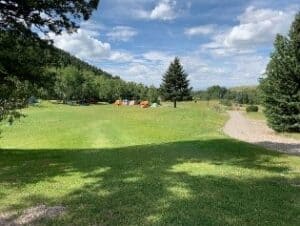 August 9th, 2023
August 9th, 2023
Thirty minutes to Big Sky, Montana complete.
No turning back now.
Jim and I arrive at the retreat. I unpack my gear and set up my home for the next four days. It’s beautiful out here. Once my tent is ready I walk to the registration area. It quickly becomes apparent that many of these retreat goers already know each other.
What if they don’t like me? I am just a middle-aged dude with issues who somehow made his way far from home. Ain’t nothing special about me. Heck, I don’t even know if I like me.
The voices persist.
Maybe I’ll just stand here and pretend I’m feeling confident. Keep your hands out of your pockets Adam. Be cool man. Be cool.
But It didn’t take long before it happened. One, after another, after another approached me. “Where are you from?” they would ask. “You drove here?” “That’s so cool!” “Do you have a family?” “What are their names?”
My God they are so kind. Are all of them like this? Soon I realized that yes, they are. I wondered why. By the end of our time together I found the answer.
It’s because we all share in each other’s unavoidable suffering.
I used to think I could drown that suffering with booze, repress it somehow, maybe even eliminate it, alone. But as you might have guessed it never worked. It only made it worse.
Instead, in the presence of others working their recovery in the stunning landscape of Big Sky Montana, I dared to expose my suffering. I didn’t fight it, I didn’t hide it, I didn’t drown it, I shared it. And they shared theirs with me. And it was beautiful.
Connection is the opposite of addiction and I get it now.
I am here.
I am whole.
Finally.
August 23rd, 2023
My reentry home was purposely slow. I took my 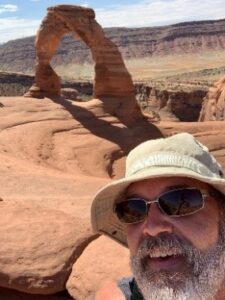
new-found freedom into the Utah desert first, then back up
into western Colorado to meet my Recovery Elevator
accountability partner, and finally back to the unbearable
Texas heat.
Everything’s changed.
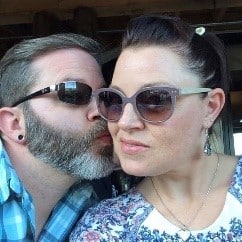 I missed her.
I missed her.
And come to find out, she missed me.
Today was our first day of marriage counseling.
I’m hopeful.
The negative voices, they’re still there. But they’re quieting, fading. Why? Because I have recovery tools to work with now.
And I have friends.

by RE Helper | Nov 21, 2023 | Blog, Early Sobriety, Helpful Tips, Holidays, Uncategorized
A special holiday bonus blog from one of our Café RE members!
Holiday Survival Guide: Tips and Tricks
By: Adrienne (Café RE GO)
The holidays are coming and everyone is drinking….Sending out an SMS (Save My Sobriety)!!
We’ve all been there. The annual holidays set in and the only non-drinkers are you and the kids!
The question you may be asking yourself is…
How do I stay strong when the holiday vibe is booming and everyone is in party mode celebrating all that we have to be grateful for?”
To reframe this question I would ask…
How do I honor myself and my goals of sobriety in this time of annual appreciation for myself and my loved ones?”
How do I want to celebrate in a way that is relaxing, Fun (Rule 22 here from Café RE), and supports me feeling great in the moment and the following day?
Play the tape forward and then imagine yourself remembering the gathering; how do you want that to look or feel?
What tools will I bring with me to keep me accountable to the life I want to live? (The tools are different for everyone.)
For me, I bring my smartphone so I can stay close to my supports (Café RE peeps). I bring AF drinks (Athletic Brewing Co., Run Wild NA beer is a favorite). I bring an open mind. I’ve even brought my list of my why’s before tucked in a back pocket. And I bring an exit plan. The exit plan is my trap door and it’s a must. This could include me just leaving the party without saying I’m doing so, I may tell someone close to me that I’m out, or I may do the long goodbye; you know the one with all the hugging :).
What do I say if they offer me a drink or ask why I’m not drinking? There are several ways to come at this.
You can bring your own drinks, if it’s an AF beer odds are they won’t even notice that you aren’t actually drinking the poison (I’ve tested this one out). If offered a drink; “sure I’ll have a water”.
If further probing into why you aren’t drinking stick to the facts. You could say your not drinking anymore, you could say you are driving, you could say you aren’t drinking tonight. The secret to this scenario is you are more invested in what’s going on with your path than they are. Most people don’t really want the laundry list of your alcohol history. They want to know, are you in or are you out. Odds are they won’t even care what your ingesting once they are in the haze.
If things get awkward change the subject, use the bathroom to regroup, put your needs first, and if all else fails…trap door my friend.
Buuuuut….What if they think I’m boring?. First, who are they specifically? Is there really a they or is it just your inner dialogue trying to sabotage you with old thought patterns?
Listen….YOU ARE NOT BORING! You are your beautiful, authentic, one and only self! Sober life is anything but boring.
Buuuuut…What if they think I’m judging them or they are bummed I won’t drink with them?
Oh that’s right, the people pleasing!
I know it well friends. If I do the thing they want then they will like me, think I’m cool, and/or want to hang out with me.
Maybe that’s all true, but is it worth compromising your own comfort for theirs?
In the moment this may be uncomfortable but I’m asking you to stay with it. Exposure to our fears/triggers and staying the course is important field work to success. Every time you overcome a situation with your own tools for change and growth you get stronger! Each time you succeed you are gaining experience to draw from that proves that you can navigate life and socialize sober! You learn who is an ally in your life, who to put your energy toward, and who you want to develop relationships with.
On this holiday season my wish for you is that you put your needs first, protect your sobriety, be gentle with yourself, and please listen and honor yourself. I hope you find all the joy that exists with your family and friends
Happy Holidays!
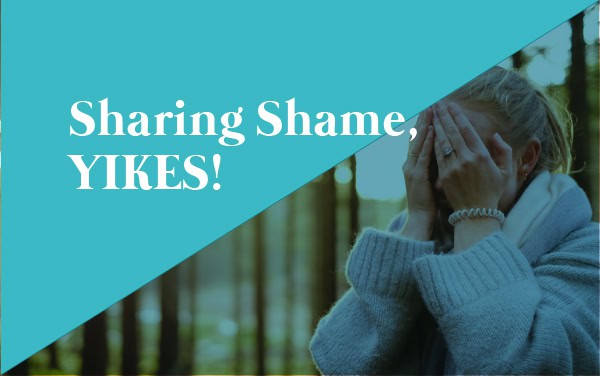
by RE Helper | Nov 15, 2023 | Alcohol Free, Blog, Early Sobriety, Expectations, Helpful Tips, The first Year, Uncategorized
Today’s blog entry is from Dustin Wade, who has been a member of Café RE since March 2021. Dustin has been alcohol free since January 30, 2020. He is very active within his Café RE UP group and on our community chats.
Towards the end my drinking progressed to the point that I started drinking as soon as I woke up. I knew this was taking me down a dark path.
This behavior started when I was newly divorced, single and could do whatever I wanted. Why not start drinking first thing in the morning? Fast forward, now in a relationship (with my now new bride!) I would have an hour or two to sneak some in before she woke up, and the sneaky behavior began!
My drinking continued at work, filling various water bottles with wine, beer, and vodka to drink in my office. Going out to lunch, and sitting at the bar to drink more. I would keep the buzz going until I went home. Then I would try and hide the fact that I had been drinking all day. Oh, then there were days I would lie about working late and hit the bar again on the way home.
My car got towed one time and I lied about having to ‘work even later’ so I could get it out of the impound lot. With the drinking all day, that meant I did a lot drinking while driving, and never thought twice about it! While at the same time judging others who did it too.
Day after day, the shame ran deep.
Shame kept me drinking for far too long, and my drinking routine caused some significant weight gain. It embarrassed me. I was always the skinny kid growing up, so I felt like everyone was judging me. Growing up my family didn’t open up and talk about our struggles. This contributed to me letting the shame of drinking build up inside. Eventually, all the lying and drinking all day caught up with me and I had to face the music. When my fiancé found some hidden alcohol I had to share what had been building up inside for so long. Unable to hide behind a lie, I had to tell her how much I was drinking. Finally talking about this big secret I’d kept for so long I felt some burden being lifted. It was the scariest thing I’ve ever had to do!
I had always known that day was going to come. Part of me wanted it to happen this way, and part of me wanted to go out with a big rock bottom. A few days later, I stepped into an IOP (intensive outpatient program) and shared my shame of abusing alcohol with total strangers. Once I did it was like something reached into me and lifted this huge burden buried deep inside. I wept. It was so emotional hearing the words that I had a problem with alcohol come out of my mouth.
I quickly learned how powerful sharing shame could be.
Sharing shame can come in many forms, and you may want to know who your audience is before sharing. It might be with loved ones, close friends, AA meetings, your sponsor, therapists, rehab programs or publicly, like on the RE Podcast. It might be a post in a private Café RE group or a share on a Café RE chat.
A big share for me was doing the Café RE member spotlight, where I shared my story with the group.
Along the way, I was listening to other shares, and with everyone, there was something that resonated with me, and comforting to know I wasn’t alone. For this reason, I continue to share, because you never know who may need to hear what you have to say. What I realize now, is that I have shared shame is safe places, and I knew the audience. I think this is important to note.
There is a lot out there on sharing shame. Here is an excerpt from psyche.co website about sharing shame: ‘Sharing about our shame can help us realize that others will accept us despite self-perceived flaws. Further, sharing often provides a space where others open up and actually relate to our experiences, which decreases the sense of aloneness and can increase our trust in opening up to others.’
This last part of the quote really hits home, the decrease in a sense of aloneness has been huge for me, and bright spot in my recovery. Likewise, my increased trust in opening up to others has allowed me grow and learn. There was certainly no growth when I just bottled things up inside, with no outlet other than drinking.
I will leave you with this quote by author Ann Voskamp, ‘Shame dies when stories are told in safe places.’
Have you shared your shame?
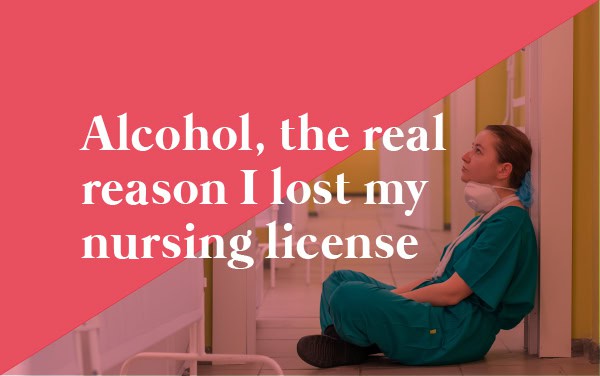
by RE Helper | Oct 15, 2023 | Alcohol Free, Blog, Early Sobriety, Expectations, Nursing, Uncategorized
Today’s blog entry is from Paulette Vantrease, who has been a member of Café RE since July 2023. Paulette has been alcohol free since March 22, 2023 and is active within her Café RE OG community.
“I blamed covid for leaving nursing, but alcohol addiction forced me when I lost my license.”
I stood on a stage about to give a speech to a few hundred festival attendees, I hated speaking in front of a crowd; I still do. But the topic was about something I knew personally, and I had lived it for many months. I felt a sense of comfort and pride in what I was going to say. Writing the speech and practicing it out loud was cathartic. I hoped I could sincerely convey all the emotions I felt up to and on that day. My head was clear, my heart full, and I was sober for several weeks that day.
On September 11, 2021 I was asked by an acquaintance to speak at a festival. Asked to speak about my experience as a nurse in the emergency department during the pandemic. The worst of covid had passed by then though fear and caution remained throughout our community and much of the country. My focus was on what I saw and lived through in the ER, dealing with non-believers (including a few of my own siblings back home), and the raw emotions felt during and still to that day whenever I thought of those difficult shifts in the hospital.
What I omitted in that speech was my struggle with alcohol throughout the entire span of the pandemic.
As ER nurses…
As ER nurses we deal with people every shift who are at their very worst: mildly or critically ill or injured, in psychiatric crisis, actively dying, and just about everything else you can imagine. We are hardcore adrenaline junkies who thrive on the chaos the department gives us. We willingly work in an environment no one wants to be, most certainly the patients.
The article “Alcoholism and Medical Professionals” states that 10-12% of healthcare professionals will develop a substance abuse disorder during their careers, including 1 in 5 nurses. It also states that the numbers are likely even higher due to vast underreporting. Drinking is the norm after a shift, most certainly after a particularly difficult one. Us night shift workers would often leave the hospital in the morning to go have “breakfast” at a local restaurant that served alcohol after 8:00 am. Food was often only an option.
To say alcoholism is rampant among healthcare workers, especially those in critical care areas, is an understatement. Alcohol is an easy outlet to numb the mind and body after desperately trying to save a young car crash victim only to watch him ultimately slip through your fingers. For me personally, drinking became my daily therapy session.
My first successful attempt at sobriety began in late May 2018.
I had been drinking daily and much to my shame and guilt even before work to feel somewhat normal. As William Porter describes in his book “Alcohol Explained,” our brains are essentially hijacked by alcohol and eventually we need to drink in order to simply function normally. It had got to the point where unless I drank my anxiety was unmanageable. I would begin to withdraw from the effects of alcohol. And eventually withdraw I did. Hard.
As a nurse I took care of detoxing patients and knew all too well how dangerous it could be. So, on a trip out of town with a dear friend that May afternoon the symptoms began on the car ride and though I was completely in denial, I could not get to a hospital fast enough. It scared me shitless. In the ER as my blood pressure read 200s over 100s and my heart rate 180+, I admitted to the doctor that I had been on a very long bender and stopped cold turkey a few days prior. When he ordered 2 mg of Ativan, I believe the relief on my face was visible to everyone in the room, and as it entered my veins the calming effect was almost immediate.
I could not deny any longer what was happening.
The phrase “scared straight” entered my mind and stayed there for a very long time. Looking back on and remembering the physical symptoms of withdrawal kept me sober for over 20 months. In the hospital I was diagnosed with cardiomyopathy, had a cardiac catheterization, and put on a regimen of medications for my heart, blood pressure, and lingering withdrawal symptoms. I entered an outpatient program and went to my very first AA meeting. One would think that all of this would have kept me sober for the rest of my life. But sheer determination without any plan in place only lasts so long.
Complacency in sobriety is like a bomb waiting to go off, and mine was ticking away the hours. For months I had been planning a dream vacation to Hawaii. I was set to go in early 2020. By then I had stopped going to AA blaming it on work constraints and subconsciously knew that I would drink there. The memory of detoxing had faded and the trip of a lifetime by myself was meant to be epic. The relapse there was epic as well. Queue explosion.
When I returned from Hawaii covid had begun to make waves as an up-and-coming new deadly virus. I had reached out to an old AA friend and somehow got back on track into sobriety. It didn’t last long. Covid hit with full force along with my drinking. I had countless attempts at sobriety throughout the pandemic however I simply could not sustain any stretches for long. It was a very dark time period for so many people including those of us trying to get and stay sober. Looking back, it is a blur of dying patients, daily chaos, uncertainty, and alcohol to numb it all.
In the summer of 2021 I was introduced to an online community called, “The Luckiest Club”. By then I had given up on AA but knew I needed something, anything to help me get sober. The spiral down to daily drinking had its grasp on me and I was completely powerless. TLC was like a breath of fresh air for me. I had heard of different types of recovery programs such as SMART recovery, Sober Sis, Recovery Dharma, and the like. But this was unique, and I immediately fell in love with the forum. I attended the online zoom meetings, joined subgroups that interested me and began to raise my hand and speak in meetings, which I never did in AA. I was sober again and felt incredible.
During the speech I gave that September day in 2021 all the emotions and memories of covid came crashing back. A state politician was there listening to me and stopped me as I was leaving to thank me for my service. He said you could hear a pin drop while I was on the stage which at a music festival was quite the feat. Several other attendees thanked me, shook my hand, and even hugged me. In hindsight I knew I should have reached out to someone, anyone from TLC or AA or my friend who drove me to the hospital back in 2018. Instead, I ended up at the liquor store. I got obliterated at home. The old wounds were ripped open, raw, and I wanted to eliminate the pain. STAT.
The rest of 2021 and 2022 was a continuous cycle of drinking. I was depressed. My drinking made my depression worse. I tried numerous times to quit and even had a few stretches of sobriety interspersed. By then I had lost my nursing job and my license due to alcohol and was floundering with what to do with my life. In spite of admitted to a psychiatric hospital a couple of times for suicidal ideation the drink had me in its grasp. If there was a rock bottom, I think I hit it more than once.
I took my last drink on March 22, 2023. The same day, I was admitted to the psychiatric hospital. I didn’t have a job. I was living with my son drinking away the days, foolishly thinking I was cleverly hiding it from the world. Upon my release I rejoined TLC, attended as many meetings there as I could, and immersed myself in reading and re-reading books such as “Quit Like a Woman” by Holly Whitaker, “Alcohol Explained” by William Porter, “This Naked Mind” by Annie Grace and several others. I recently began listening to podcasts and joined Recovery Elevator as well. I now listen to several a day. Paul Churchill’s interviews on the Recovery Elevator Podcast are my new daily therapy. I place more tools in my sobriety toolbox as I discover them.
Today, October 15, 2023, I am 207 days sober, and it is the longest stretch since 2020. I have found community and fellowship in TLC and Café RE. I have reached out to other members and met them in person. We text or talk on the phone, or message each other on the forum. I have a therapist who specializes in addiction who helps to guide me along in this journey. What the future holds or if I will remain sober, I do not know. I am unsure if I will, or even can, return to nursing. As cliché as it sounds, I take one day at a time. Everything feels right though, as if the universe finally put everything in place, and it feels amazing. It IS amazing.
Peace, Love, & Joy
Paulette





 Eight hours to Trinidad, Colorado complete.
Eight hours to Trinidad, Colorado complete.  August 6th, 2023
August 6th, 2023
 August 9th, 2023
August 9th, 2023
 I missed her.
I missed her.



